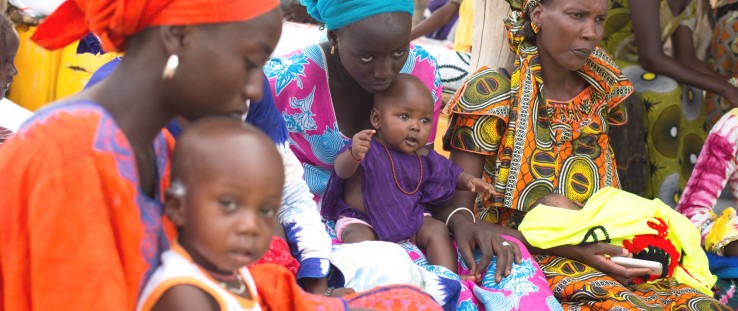 Women gather for a mother-to-mother meeting in the village of Doumga Rindiao, Senegal, September 2012.
Olivier Asselin
Women gather for a mother-to-mother meeting in the village of Doumga Rindiao, Senegal, September 2012.
Olivier Asselin
 Women gather for a mother-to-mother meeting in the village of Doumga Rindiao, Senegal, September 2012.
Olivier Asselin
Women gather for a mother-to-mother meeting in the village of Doumga Rindiao, Senegal, September 2012.
Olivier Asselin
Researchers have known for some time that smart family planning can save the lives of hundreds of thousands of mothers, children and infants every year.
Enabling women to practice healthy timing and spacing of pregnancies could reduce maternal deaths by 30 percent and cut child deaths by 25 percent.
That was the motivation behind the Ouagadougou Partnership, a first-time collaboration between USAID, the Government of France and other partners that began in 2011 and is targeted at nine West African nations. Much of the work focuses on getting high-level government commitment to tackle the issues that limit the use of voluntary family planning methods by women in Benin, Burkina Faso, Côte d’Ivoire, Guinea, Mali, Mauritania, Niger, Senegal and Togo.
Ultimately, the goal is to reach an additional 1 million women with family planning services by 2015.
“Francophone West African countries have made slow progress in reducing maternal deaths and meeting the need for family planning,” said USAID/West Africa Mission Director Alex Deprez. “But governments of the Ouagadougou Partnership countries have recognized the importance of family planning and are committed to educating their public about its benefits. By helping those governments to integrate reproductive health and family planning into national development strategies, we are helping them save thousands of lives each year.”
There are many common barriers for women who desire family planning in West Africa. They include lack of knowledge and misinformation about various family planning methods including use and cost, and social-cultural factors such as husbands and mothers-in-law making decisions about a wife’s health care choices, and community leaders discouraging family planning. Women also often travel long distances to health centers where health care providers give poor service, the client’s method of choice may not be available, or the provider may discourage use of the preferred method.
In 2013, the Population Reference Bureau reported that, worldwide, the average number of children per woman is 2.5. However, in Francophone West Africa, the average is 5.5 children per woman, ranging from five children in Benin, Cote d'Ivoire and Guinea, to eight children per woman in Niger.
At a Crossroads
West Africa has one of the fastest growing populations in the world, and it is expected to double in the next 25 years. This rapid population growth can negatively impact economic growth, food security, women’s and girls’ health, educational opportunities and livelihoods. In addition, it can influence governments’ ability to deliver basic services and the demand for clean water.
According to a UNICEF report published in 2013, West and Central Africa lag behind all other regions in child survival and have seen virtually no reduction in the annual number of child deaths since 1990.
“The approach envisioned that is most urgent is to improve the health of the mother and child under age 5,” said Dr. Bocar Mamadou Daff, director of Reproductive Health and Child Survival in the Senegal Ministry of Health. “In other words, to reduce the maternal mortality rate by 75 percent from the current rate of 392 per 100,000 live births, and to reduce infant and under-5 mortality by at least a third. We can’t achieve this without birth spacing. Our policy is not to stop or limit births but to better space them—to allow the mother to be in good health and to allow the child to breastfeed for at least two years and the mother to rest for another one to two years before getting pregnant again.”
USAID has been working closely with government officials in the nine countries to develop national family planning action plans that, in most cases, aim to double access to modern contraceptives over the next five years. That includes the pill, IUDs, injectables, implants, male and female condoms, diaphragms, emergency contraception, and female and male sterilization. This means that women who want them will be able to readily and easily obtain a wide range of contraceptive methods at the time of service, whether in a health facility or pharmacy.
“We’ve never had such a detailed plan, developed through such a participatory process,” said Oumou Keita, the focal point for family planning at the Ministry of Health in Mali, adding that a number of ministries and their civil society partners were fully engaged in the effort. “All aspects of family planning are taken into account.”
Daff described the process to develop Senegal’s national plan as “absolutely beneficial.” Moreover, Senegal’s efforts to promote access to voluntary family planning information and services already seem to be working: Preliminary results presented in September show that use of modern contraception among married women has increased from 12 percent to 16 percent in just one year.
“I use family planning because I had pregnancies too close and I suffered,” said Daba Dione, who lives with her husband in rural Senegal. When she and her husband visited a nearby health hut for family planning counseling, the matron explained all the methods, with their advantages and disadvantages. Dione chose to use the injectable method.
“I prefer injectable, because it is convenient,” she said. “The date of your appointment is fixed in advance on a paper so there is little risk of forgetting. I take the injectable every three months. In addition, I can stop the method when I want. Family planning is beneficial.”
Speaking on the benefits of family planning, her husband Michel Diouf added that, “If your child falls ill, you have to care for it. You buy prescriptions and take the child to the clinic. You stop working. Now there is less illness. Money that I spent on prescriptions, I now save.”
USAID, French Ministry of European and Foreign Affairs, French Development Agency, Bill & Melinda Gates Foundation, William and Flora Hewlett Foundation, United Nations Population Fund, World Health Organization, German Development Bank, West African Health Organization
Related Links
Expanding Choices in Mali
By Jane Silcock and Andrew ParkIn
In Mali’s capital, Bamako, 21-year-old Kadidia Dembélé wants to have more children—just not right now. She heard from a neighbor that she could receive family planning counseling and services at the health clinic.
“If you have too many pregnancies too close together, the baby and I could get sick,” said Dembélé, who is already a mother to two children, ages 5 years and 4 months.
When she visited her local health clinic to receive routine immunizations for her newborn, she learned more about the benefits of family planning and decided to receive a contraceptive implant.
Through USAID funding, local midwives receive training at health clinics to provide family planning counseling and services to women coming in for immunizations and other health services for their children. In fact, Diakite Hadjara Goita, a midwife, had recently received training on IUD and implant insertion, and expanding choice to long-acting reversible methods of contraception. “I’ve inserted implants for many years, but only through this project I received proper training,” she said. “[The project] is very important, because most of the women prefer the implant.”
Mali families typically have six children. Although the percentage of married Malian women who use a form of modern contraception has increased around 4 percent in the last six years, it still remains one of the lowest rates in the world. Investments like these, that combine outreach efforts and integrate the delivery of effective health service, allow Dembélé and many more women like her to understand and enjoy the benefits of healthy timing and spacing of pregnancies.







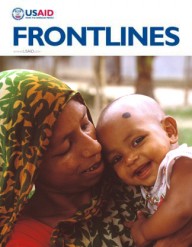


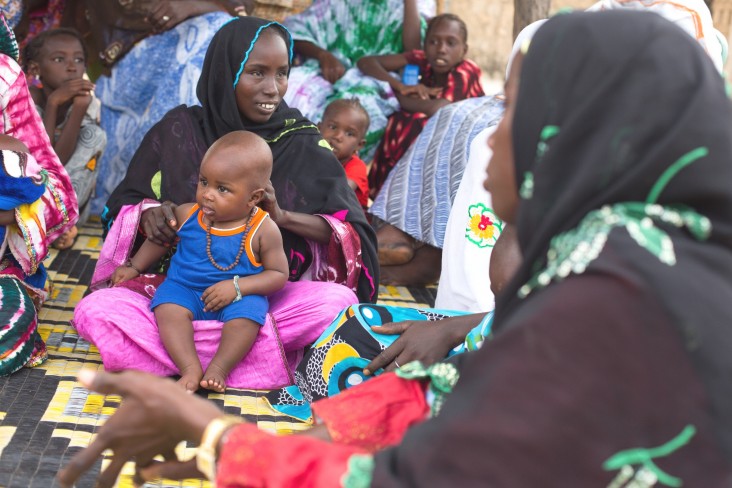
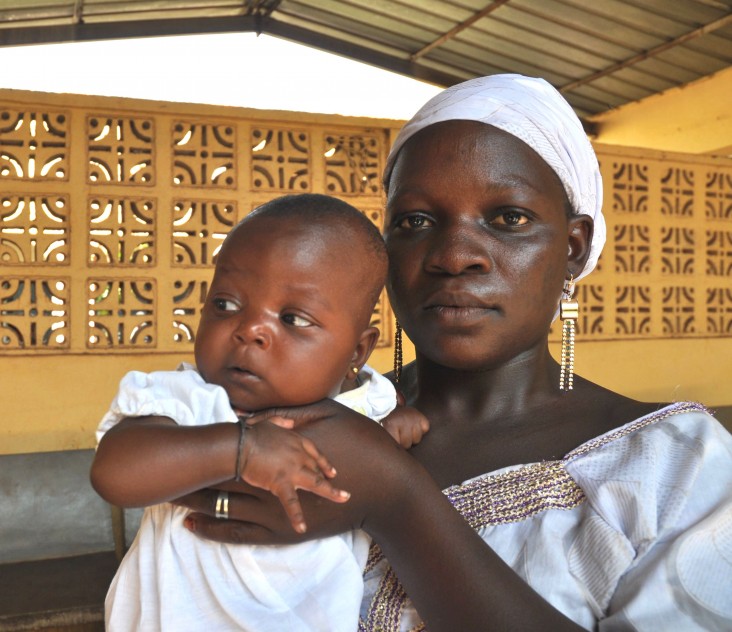
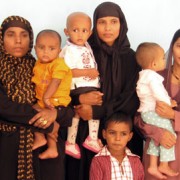

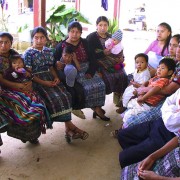
Comment
Make a general inquiry or suggest an improvement.